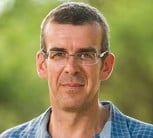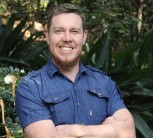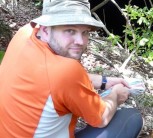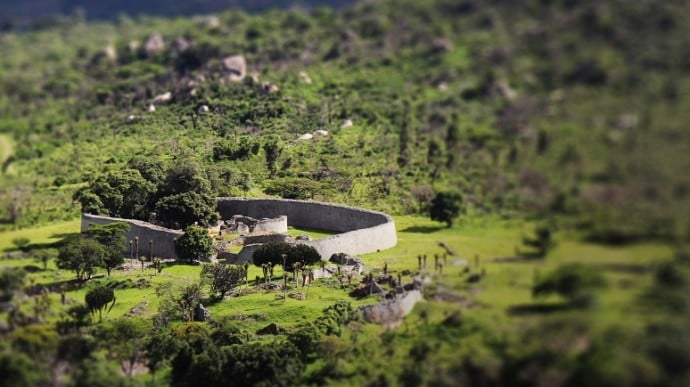Professor Andrew McKechnie is a Professor of Zoology at UP and South African Research Chair in Conservation Physiology at the South African National Biodiversity Institute.
Prof McKechnie did his undergraduate studies at the University of Natal and has been doing research at UP since 2008.
The research that he and his team do contribute to the betterment of the world we live in because it provides a better understanding of how birds and other animals are being affected by climate change. “Climate change is probably the single greatest threat facing biodiversity at present,” he says.
Prof McKechnie cautions that the public should know the climate we currently live in differs substantially from the climate of 30 years ago, and the rate of warming is accelerating. “Climate change poses substantial risks for humans and all other species on Earth,” he adds.
More from this Researcher
Wildlife researcher and lecturer Professor Michael J Somers is recognised internationally as an expert in his field, and currently serves on four International Union for Conservation of Nature specialist advisory groups: African wild dogs, otters, wild pigs and small carnivores.
Born in Pietermaritzburg, he studied zoology, botany and wildlife management at the University of Natal (now University of KwaZulu-Natal) and the University of Pretoria (UP) before obtaining his PhD in zoology from Stellenbosch University.
Currently an Associate of the Mammal Research Institute at UP and a core team member of the Centre for Invasion Biology in the University’s Department of Zoology and Entomology, Prof Somers’ main research focus is on carnivore ecology, conservation and wildlife management.
Following a four-year stint in the field studying wild dogs in Zululand, he returned to teaching in 2001, a passion he discovered during his PhD studies.
His research output has also been prolific, having published 129 papers in peer-reviewed journals and book chapters, 40 other publications and two books (with a third book in press). He has also supervised or co-supervised 42 honours research projects, 21 research MSc and eight PhD students.
Research conducted with his students have covered a wide variety of subjects, including the impact of fencing on wildlife; studies on species ranging in size from spiders and crabs to predator species such as lion, cheetah and leopard, and whales; as well as studies on aphids, seed dispersal or the impacts of fire.
Last year, Prof Somers co-authored a paper voicing strong concern about the Animal Improvement Act (1998), cautioning that reclassifying several South African wildlife species as farm animals would not “improve” the genetics of the species and would instead have considerable negative genetic consequences and pose ecological and economic risks.
Prof Somers has also served as Editor-in-Chief of the South African Journal of Wildlife Research, Academic Editor of PLOS One and PeerJ, associate editor of Mammalian Biology and African Journal of Wildlife Research, and sits on the editorial boards of Koedoe and Nature Conservation Research.
Of the many wildlife species you have studied, is there one animal that fascinates you most?
African clawless otters, which I did my PhD on. Although you do not see them often, every encounter with them is memorable.
What attracted you to teaching?
I instantly liked teaching, and the students seemed to like my approach. Students want their lecturers to be engaging, humorous, wise and informative. At the start, I was young and naive, with no formal teaching training or the advantage of having read good books on teaching and learning, but I still got good feedback, which convinced me to follow an academic path. By the time the students graduate, they should also be able to use the knowledge, think independently, gather information themselves and be able to assess new knowledge.
With the rapid growth of Africa’s human population and disappearance of wild landscapes, are you optimistic that wild animals have enough space to survive?
It is context dependent. An increasing amount of land has been put under conservation, which is encouraging. An example of this is the Transfrontier parks. However, even in many African conservation areas, the numbers of animals are declining owing to the overuse of resources within these areas. We have a new project in West Africa, and I have been shocked to learn how few of even the large charismatic species such as lions and wild dogs are left there. Wildlife still needs more space and protection in that space.
You co-wrote a book on the pros and cons of fences for wildlife. Will fences ever disappear?
Although the preferred scenario is to have fences disappear, I do not believe they will go for the most part. Present reserves will continue to drop barriers to join others or become part of more extensive reserves. This is good for ecosystem functioning. Many reserves in Africa do not have fences but rather buffer zones, which sometimes work. As the human population expands and needs more resources, the reserves are put under increasing pressure, the buffer zones are not appropriately managed and the animals in the reserves are overharvested. Although not ideal, but as shown to be somewhat effective in South Africa, fencing some new areas, maintaining the fences and having effective law enforcement may be needed.
As a lecturer, what is your approach to instilling ethical behaviour in your students?
As we often see in the media, the wildlife sector (like any industry, really) is plagued by corruption and unethical behaviour. This includes poaching, wildlife theft and the poor treatment of animals. Our students are likely to encounter this after leaving university, so it is essential to alert them to this and try to instil in them a good work ethic and respect for wildlife as a whole, as well as for individual animals.
What do you do in your spare time?
I still enjoy game drives to watch animals, often in our local Rietvlei Nature Reserve. I also try to play the guitar.
More from this Researcher
Professor Christopher Weldon is an Associate Professor in Applied Entomology at the University of Pretoria (UP). He completed his undergraduate studies at the University of Newcastle in Australia, graduating with a Bachelor of Environmental Science (honours) and the Dean’s Medal. He has been pursuing research at UP since he was appointed as a lecturer in Applied Entomology in 2012.
Prof Weldon says his field of research would contribute to the betterment of the world because human health and livelihoods often intersect with the activities of insects. Using a foundation in insect behaviour, ecology and physiology, his research aims to address these interactions, whether negative or beneficial, with a focus on flies but also insect pests of horticulture. Results from these studies inform sustainable management practices that can reduce reliance on pesticides but may also facilitate the beneficial use of flies.
He leads a research group of postgraduate students at honours, master’s and PhD level. “We pursue projects on the traits that make fruit flies destructive and invasive pests; the behaviour and movement of fruit flies that damage our fruit for consumption and exports; the biology and management of mosquitoes and other blood-feeding flies that affect human and animal health; and the use of flies for bioconversion of organic waste to promote a sustainable, circular economy,” Prof Weldon explains.
New research that the professor and his research group have been working on over the past 18 months has been the practical interventions that can be used by hotels to reduce mosquito abundance, the nuisance of mosquito bites and the potential spread of diseases. Such practical interventions will improve the experience of hotel guests and encourage tourism.
Prof Weldon and his group have also done research on how body condition and environment affect fruit fly attraction to lures and movement in the field; the diversity, abundance, and damage caused by thrips in avocado and macadamia orchards; and how to improve surveillance of invasive pests of citrus. All this work is being done in partnership with South African horticulture industries as well as international organisations to improve the productivity and competitiveness of South African horticulture.
His advice to school learners or undergraduates who are interested in his field is to read widely about the diversity and importance of insects. There are plenty of interesting and reputable sites featuring that kind of content, Prof Weldon says, such as Entomology Today, as well as great books on insects in southern Africa. He also suggests they join a society like the Entomological Society of Southern Africa or the Lepidopterists’ Society of Africa to learn more about insects from experts and have opportunities to work with them. “Register for an undergraduate degree programme in Entomology like UP’s BSc Entomology, he adds, “and be sure to take the right subjects in school to be admitted.”
More from this Researcher
Dr Mark Keith completed his undergraduate studies at the University of Pretoria (UP) and has been doing research at the University since 2013.
His research focuses on understanding how mammal species and mammal guilds are structured and able to persist in landscapes that are undergoing land use change.
“If we have a better understanding of how mammal species and mammal guilds persist and respond in lieu of land use change and management decisions, we will be able to improve system resilience, ecosystem services and survival of species,” he says.
Dr Keith is part of a collaborative team working on the Biodiversity of the Waterberg Mountain Complex under principal investigator (PI) Professor Nigel Barker of UP’s Department of Plant Sciences. This research will include botanical, entomological, mammalian, avian, fish and herpetological assessments that provide key baseline biodiversity data; this data will offer information and insight into how to assist in essential management and conservation planning and decisions. Dr Keith regards this endeavour as a research highlight as well as the use of artificial intelligence to explore big datasets.
He hopes his research will contribute to a better understanding of ecosystems, which can lead to more informed management and conservation strategies.
He is also a collaborator on the Snapshot Safari South Africa work undertaken by PI Prof Jan Venter of Nelson Mandela Metropolitan University.
Dr Keith’s research matters because with the increasing impacts of human-associated global change, we need to understand how to maintain systems and species in order to supply and maintain ecosystem services.
“We require urgent information on how species persist, and how guilds are constituted and maintained in landscapes undergoing change,” he says. “If we cannot protect and manage these systems, we will lose more species with the associated loss in ecosystem resilience and services.”
As for advice to school learners and undergraduates interested in his field, he says: “There are a lot of amazing opportunities out there, but many of these are difficult to find and secure, and often require some sacrifice. For example, it could be away from home or you may have to work in remote places. Be passionate, and find and take on these opportunities.”
On a personal level, Dr Keith is interested in new technologies to assist in research and conservation.




 Story
Story
 Story
Story
 Story
Story
Get Social With Us
Download the UP Mobile App